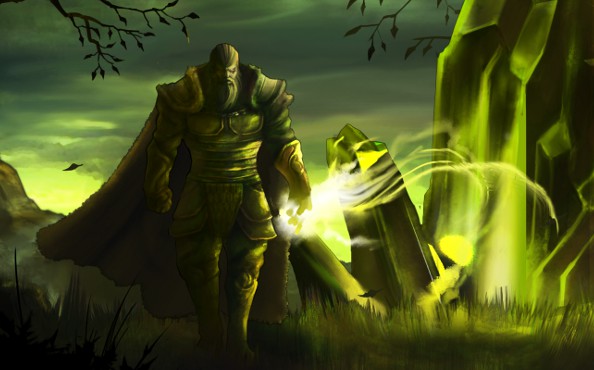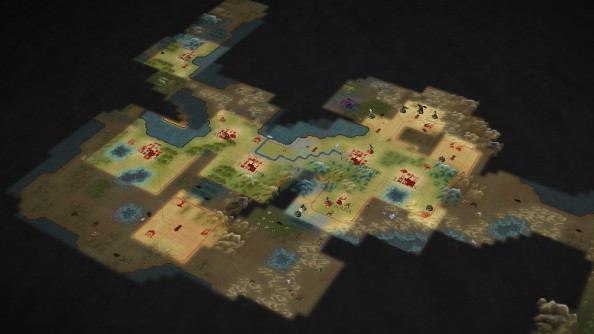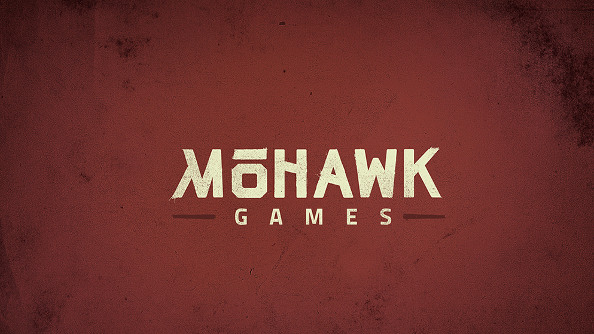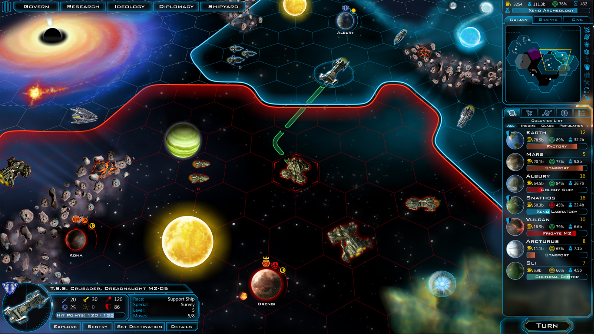In recent weeks, Stardock has made a number of moves that point to a very different direction for the Michigan-based publisher-developer. In addition to announcing a new edition of their Galactic Civilization franchise, they have also helped fund and launch Civilization IV developer Soren Johnson’s new studio, Mohawk Games. They also helped found Oxide Games, a new developer that’s working on a 64-bit engine specially designed around strategy games.
It’s all driven by something called the “Stardock strategic investment fund”, which sounds a bit like something a supervillain would use to fund the construction of an underground bunker and cyborg research. It’s how Stardock are reinvesting the proceeds of the sale of their digital platform, Impulse, into repositioning the company as a more diverse publisher and a more professionalized developer. Given how ambitious Stardock CEO Brad Wardell’s plans for the company sound, however, the underground bunker may not be far behind.
To understand Stardock’s direction today, you have to understand what happened with Elemental: War of Magic. In many ways, Stardock is still shaped by that game’s disastrous launch.
Prior to Elemental, Stardock still very much styled itself a tiny indie developer, despite some major successes to its credit as a publisher and developer and a rapidly growing development studio. Brad Wardell oversaw everything, both on the game development side of the company and the software side, where Stardock has a lucrative business developing customization software for Windows. He was also one of the line developers, doing coding on his own projects in addition to trying to oversee them.
“Up to [War of Magic], my answer to problems was, ‘I’ll just work longer.’ People use 100 hours a week euphemistically; I meant it literally,” he says. “I had a day or two a week where I would work all-nighters as part of my regular schedule. After War of Magic, I was like, ‘This is horrible. I can’t work like this.’”
Nor could the studio. Elemental: War of Magic released to poor reviews and widespread condemnation of broken or absentee game features. It was the biggest failure in the studio’s history, and sharp notice that whatever Stardock was doing, it was no longer working.
“It was ignorance,” Wardell admits. “We’re located in Michigan. There are no game companies nearby. Everyone who worked here had never worked anywhere else. We had no idea what other game companies did. I would tour them, but I had no idea of their structure. There wasn’t a huge curiosity about it. But after War of Magic happened, I talked to my friends in the industry, and talked to Jon Shafer and Derek Paxton, and that’s when we decided to reorganize.”

Over the next year, Stardock completely changed direction. They sold off Impulse, abandoning their dreams of running a strong Steam-like digital distribution platform. They went to work salvaging Elemental while also overhauling the studio’s structure. The “big indie” style that had grown up over the 2000s gave way to a far more professionalized model.
“The reason we were so slow to make these changes was a lack of realization that we weren’t just some little indie anymore,” Wardell explains. “You see the same people day in, day out, it’s really hard to wake up and realize it’s not the same company anymore. It’s not 2000 anymore. In 2010 there were 60 of us, and we were still operating like we were ten people.”
The new Stardock is filled with industry-standard positions that simply did not exist in the old structure.
“I was forced to begin building a real management team, and that turned out to scale massively. We had a lot of untapped potential, because I was the bottleneck,” Wardell admits. “Starting with the game side, we brought in Derek [Paxton], and brought in producers. Entire layers of people whose jobs didn’t exist. We hired producers, leads, project managers. The same was true on the non-game side of the business. Now we have project managers, and team leads, and it results in a much more organized, much higher morale company. Ironically, it’s made us end up being a lot more profitable. We also hired a nutritionist and trainer, which turns out to have made a lot of people really happy.”

The Second Empire
While all of this has been going on, Stardock has also benefited from a stable and very successful software business. While it’s the games company that gets most of the attention, it’s Stardock’s desktop customization software that’s powered the company through thick and thin.
“One of the things about War of Magic: it was one of eight releases of 2010. 2010 for Stardock was actually a fantastic year. And most of those releases were on the software side,” Wardell says.
Windows 8’s lukewarm reception by Windows users has been another boon to Stardock, whose Start8 basically turns Windows 8’s interface back into Windows 7. Oddly enough, Wardell himself is a bit nonplussed about the product’s success.
“From a career point of view, Windows 8 is one of those lifetime things. It’s both very exciting and a little depressing at the same time. Exciting because we have tens of millions of new people using our software, but depressing because the effort to make these programs is not in proportion to the reward,” he explains.
“We’ve had our desktop enhancement business for years. We made a product called DesktopX, where you could literally build your own desktop. It was just amazing. And it cost millions of dollars to make, and it did …okay. But then you put out something like Start 8, and it didn’t take any effort in comparison, and we’re making millions and millions off of this. It’s like the DLC thing in the PC industry. DLC makes so much money, that it’s often a bit discouraging to think about some of the things that didn’t work out.”
It’s a revealing reaction. Wardell has an odd sense of justice when it comes to a profoundly commercial business. He wants the work that makes him proudest to be Stardock’s most successful.
That’s why Stardock can’t just sit still, and it’s why Wardell is using the money from the sale of Impulse to lay the groundwork for a dramatic expansion of Stardock’s business and interests. As Wardell puts it, “Stardock is a hobby that just got out of hand,” and it remains a vehicle for making his dream projects come together.

Using the spare capital left by the Impulse sale, Wardell is trying to address some of the issues that have frustrated him about game development.
“Our industry can be very unstable,” he says. “The games have gotten so big that everyone is afraid to take chances. Where we’ve ended up, with the end of the retail age, is everyone is either a team of 100 or a team of 2.
What Wardell wants to see is more of what is sometimes called the mid-core or AA game, games with higher production values than tiny indie projects, but not wildly expensive, budget-busting blockbuster attempts. This is a niche where strategy games once resided comfortably, and where Stardock still does.
“We know there’s amazing talent out there,” Wardell says. “So the idea is: take them, give them capital so they have the resources to run a pretty good mid-size dev studio.”
Seeds of success
As Wardell explains it, Stardock supplies seed money to studios like Oxide or Mohawk, and in Mohawk’s case, Wardell takes over some of the business administration. As Soren Johnson put it in an earlier interview, this was a welcome relief, saving him from having to learn an entirely new managerial skillset in addition to overseeing the birth of a new game and development studio.
In exchange, Stardock has partial ownership of these studios and “the big string” attached, as Wardell puts it, is that Stardock has publication rights for games like Mohawk’s Mars project (working title).
What Stardock and Wardell are looking for with the “strategic investments” is a combination of efficiency and wish-fulfillment. On the pragmatic side, bringing new studios like Mohawk into the Stardock fold expands the publisher beyond what has been a fairly limited lineup in recent years. Stardock’s only released follow ups to Elemental in the last couple years (Fallen Enchantress and Legendary Heroes), and expansions for Ironclad’s brilliant Sins of a Solar Empire.

That task of expanding Stardock’s offerings should be made simpler thanks to their investment in Oxide Games, who are working on developing a 64-bit engine dedicated to strategy games.
“If we had started Galactic Civilizations 3 later, we’d have totally used Oxide’s Nitrous engine instead [of building our own],” Wardell says. “People who make first-person shooters, they don’t have to reinvent the wheel every five or six years. They can get the latest engine and move forward. WIth strategy games, though, you have to start over every time you do a new one. There hasn’t been a 3D engine designed for handling lots and lots of high-fidelity objects on the screen at the same time. That’s a big thing that Nitrous will be provide for us.”
Wardell hopes that via Nitrous, more strategy developers will be able to get an off-the-shelf solution to their needs and spend more time focusing on exploring new ideas, like Soren Johnson’s Mars project. That’s really what Wardell wants to see, as a fan of the genre. And he wants Stardock to be the home for that kind of experimentation.
Wardell has a simple goal for what he wants Stardock to be known for in the future. “I want people to say that we make the games that gamers wish were getting made,” he explains. “I’m hoping they’ll say, ‘Why didn’t someone make this already? Why weren’t there a bunch of games like this?’ I’m pretty sure they will.”
